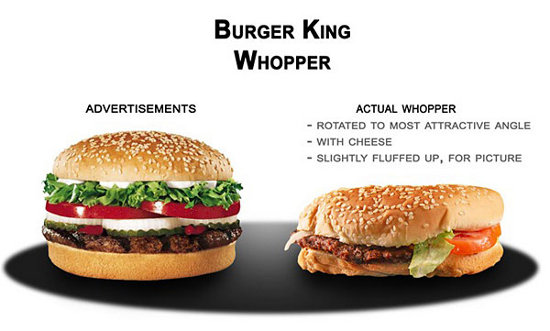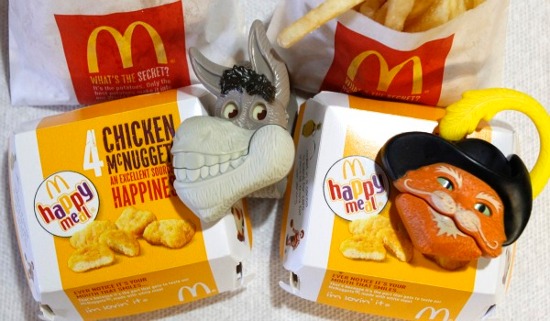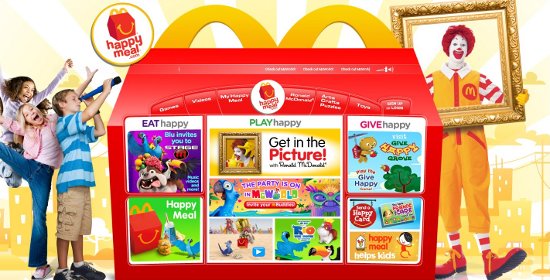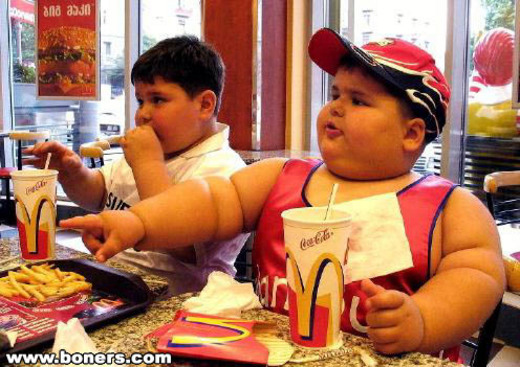
Image via Fast Food FAILS Ads vs Reality
Appetizing, right? This image comes from one of several websites devoted to examining the differences between fast food as-advertised and as-is. These sites make the same argument: the ads promise fresh, attractive food, but what you get when you buy it fulfills the worst fears of the fast-food consumer. These photographs are the equivalent of showing how images of cover models are photoshopped for magazines. They imply that the companies who push such disappointing food are dishonest cheats.
The distortions of ads ties into a larger complex of concerns surrounding the marketing and consumption of fast food. San Fransisco, for instance, recently banned McDonald's from selling its Happy Meals to protect children ("Won't somebody think of the children?") from the pernicious effects of the toy-waving, high calorie junk food. The toy always rides on other heavily-marketed children's fare, mostly movies. The accumulated force is, many argue, too much for kids or parents to withstand. The child-consumer, like the adult duped by unrealistic ads, is a mindless, uncritical consumer of media and food, drawn in by doodads, bright colors, and that clown. Our mission, then, should be to teach the young how to parse marketing.

Picture of a McDonald's Happy Meal via "The War on Happiness: Leave Happy Meals Alone", The Atlantic

Screenshot of happymeal.com
Instead, we shame them. As other viz bloggers have noted (see Bodies of Evidence, Bodies vs Behavior: The Problems with Childhood Obesity Campaigns, and Lee Price and Exposed Eating), conversations about eating and ways to combat obesity often impute some moral defect to the subjects because of their bodies. The obese, such arguments go, blindly follow the dictates of ads and yet also rational agents whom we should blame for their unhealthy bodies. Even if PSAs don't verbally blame and shame the child, images of fat kids are held up for warning and mockery. Commentary often vocally does blame the parents for their moral failings and poor parenting.

Image via McDonalds Sued Over Happy Meals
McDonald’s really does make it hard to say no to my legitimate children. I’ve tried feeding them food straight from the fridge, but apparently kids’ don’t like ice cubes and mustard for dinner. So then my kids’ catch a McDonald’s commercial on the tube – the same tube they had been watching for 10 straight hours – and they start up with their blathering nonsense about how they would love a hamburger and fries.
Parents who give in to their childrens' demands for Happy Meals are the same neglectful parents who plop their tots in front of the tv 10 hours a day, yet another moral failure.
The link between body and morality is not limited to children and fast food, however, as the Christian Diet movement shows:

Globe cover via Miss Plump Universenet
Several recent books imply that obesity is not only unhealthy, but a sin (e.g., Dieting for God and I Prayed Myself Slim). The correspondence between body and soul is easy and clear. If you do good works (i.e., eat healthy and exercise), your body will reflect it. If you sin by giving in to the deceiver and overeat, your "crime" will out as fat.
But like the habits these ideologies attack, the equivalence of body with soul is temporarily satisfying, ultimately unhealthy, and too convenient.
Comments
Dieting for God? Good grief...
Though I suppose I shouldn't be surprised, I had no idea the diet industry had sunk so low (stretched to such heights?). While I do think that the ad distortion comparisons are valid, the connections between morality and consumption are disheartening. Blaming the eater doesn't get at the issues behind the obesity problem in America - the predominant availability of cheap, unhealthy food which is much more closely tied to class issues than moral ones.
That link between
That link between (im)morality and obesity is part of my distrust of Jamie Oliver's Food Revolution. It's all well and good to say, "this food isn't the best for you to eat," if the person eating it has access to fresh food, ability to cook a meal quickly and easily, etc. The problem is that most of the people who are being targeted by the diet industry and this "revolution" do not have such access. So they are being lectured that they're killing their kids without being given the tools (leisure, money) to change the habits. Meanwhile, people watch the program to feel morally superior to those people being shown on television (as they often do with reality shows). It's incredibly frustrating and unlikely to change anything.